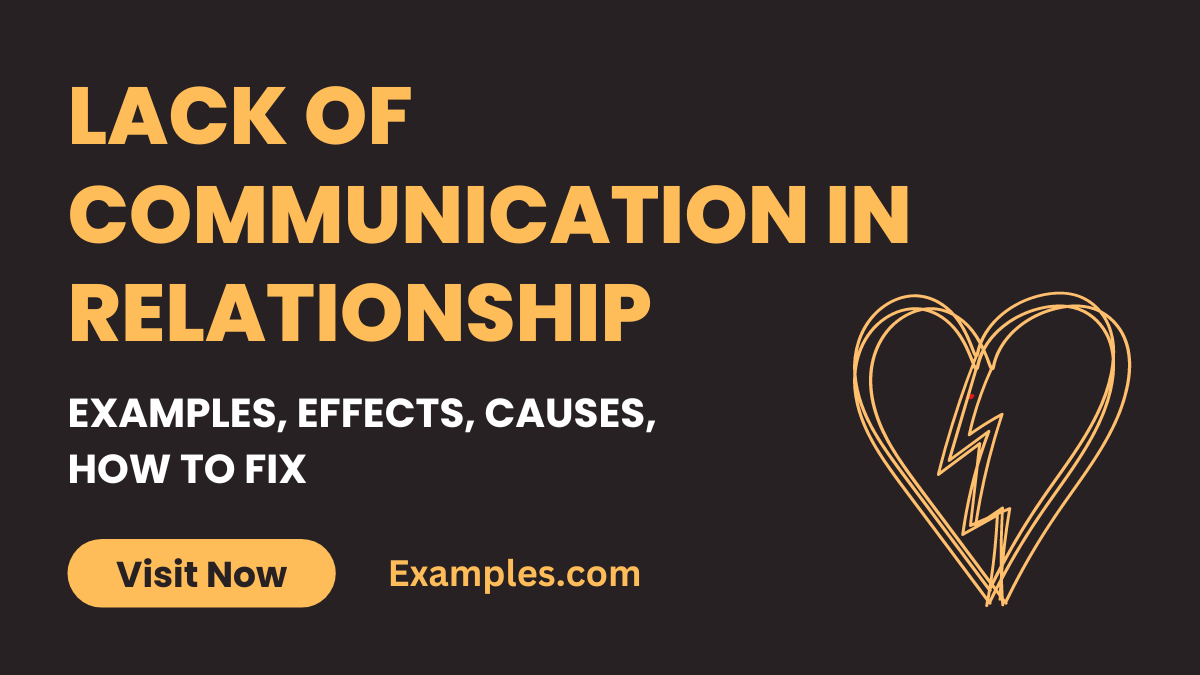9+ Lack of Communication in Relationship Examples
Communication is the cornerstone of any healthy relationship, yet often, it’s the first element to falter. This comprehensive guide delves into the intricate world of lack of communication in relationships, illuminating common pitfalls and offering practical examples. From understanding the subtle signs of emotional disconnection to exploring effective solutions, we provide insights into navigating through miscommunication in couples, trust erosion, and more. Embrace this journey to rekindle connection and strengthen your bond.
What is Lack of Communication in a Relationship? – Meaning
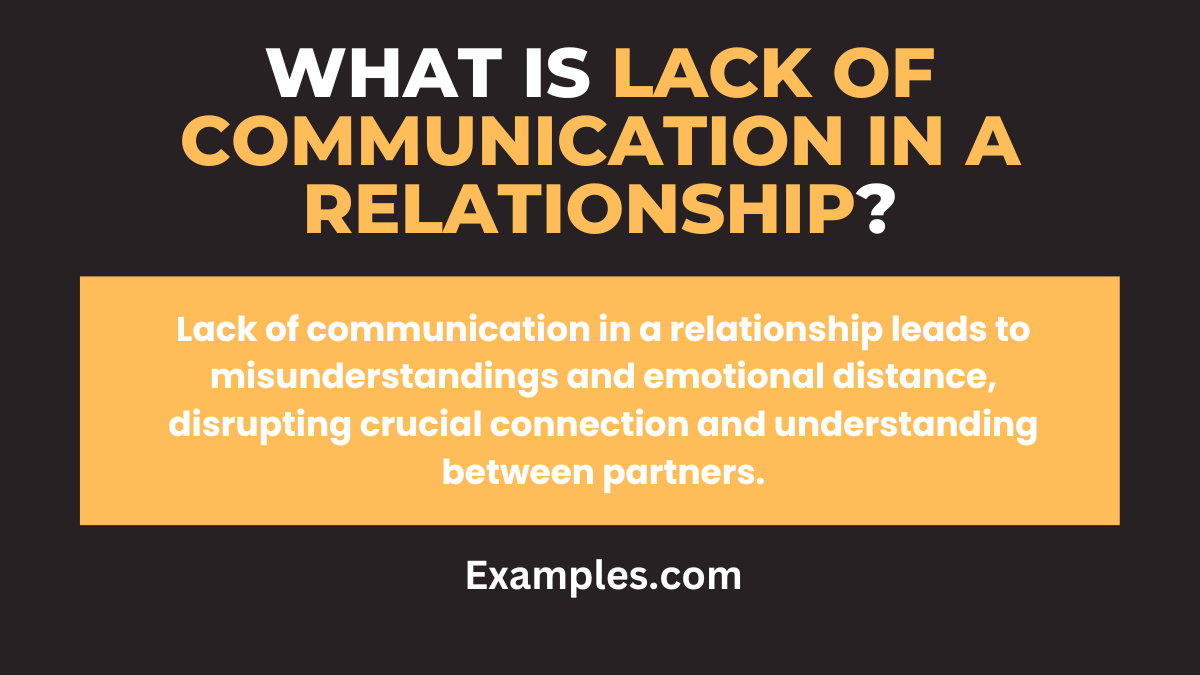
Lack of communication in a relationship means a significant reduction or absence of sharing thoughts, feelings, and daily experiences between partners. This often leads to misunderstandings, feelings of loneliness, and emotional distance. It’s not just about talking less, but also about the quality of communication decreasing. When partners stop effectively communicating, they may miss understanding each other’s needs and emotions, leading to issues like conflict avoidance and emotional disconnection. In essence, it’s a breakdown in the essential dialogue that keeps a relationship healthy and connected.
Download Lack of Communication in Relationship Essays Bundle
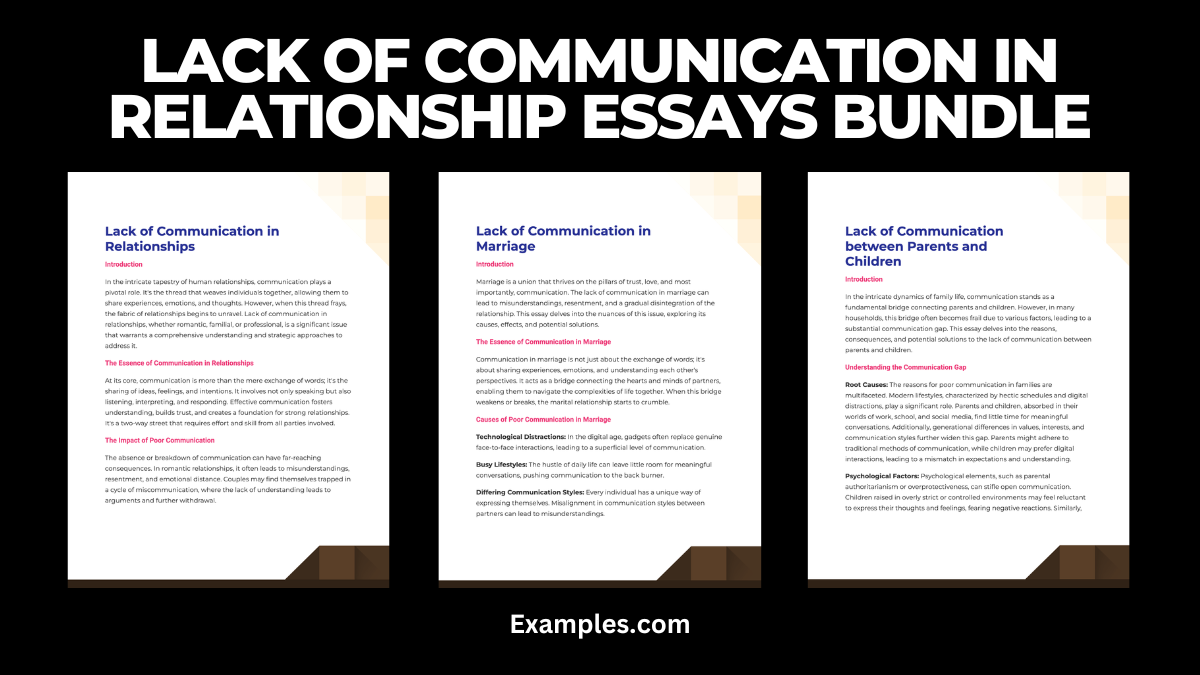
Best Quote about Lack of Communication in Relationship
“Silence is often the loudest cry. Pay attention to those you care about.”
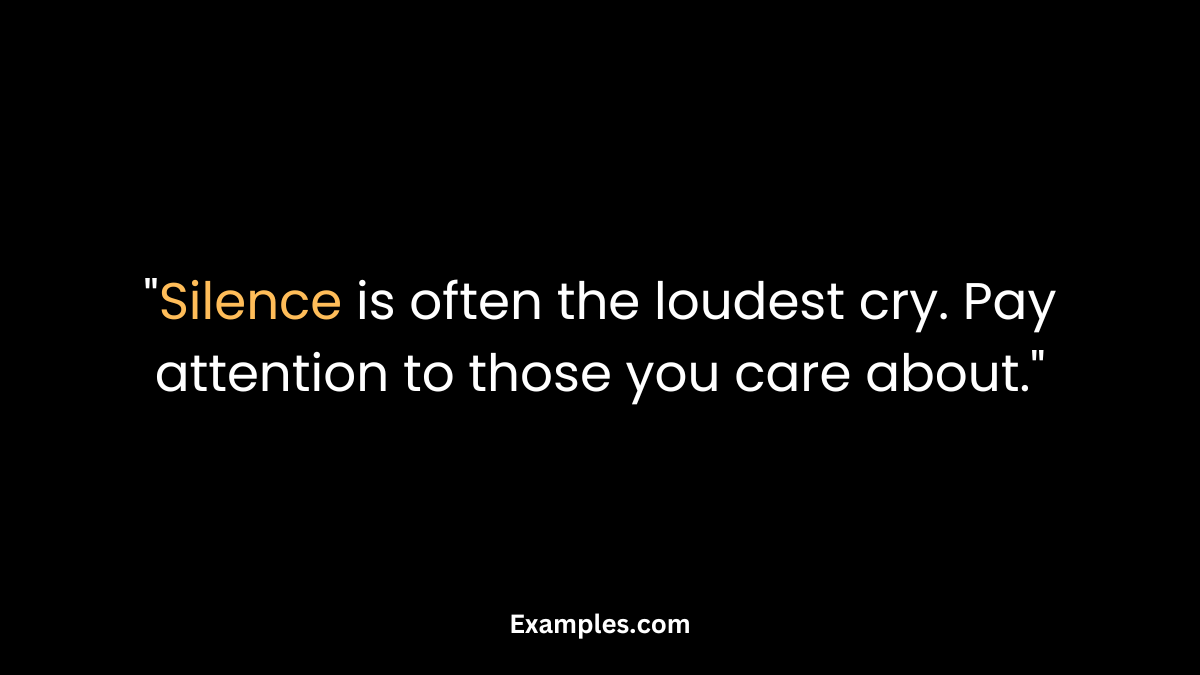
This quote encapsulates the profound impact of lack of communication in relationships, highlighting the importance of attentive, empathetic connection. See More lack of communication quotes.
10 Lack of Communication in Relationship Examples
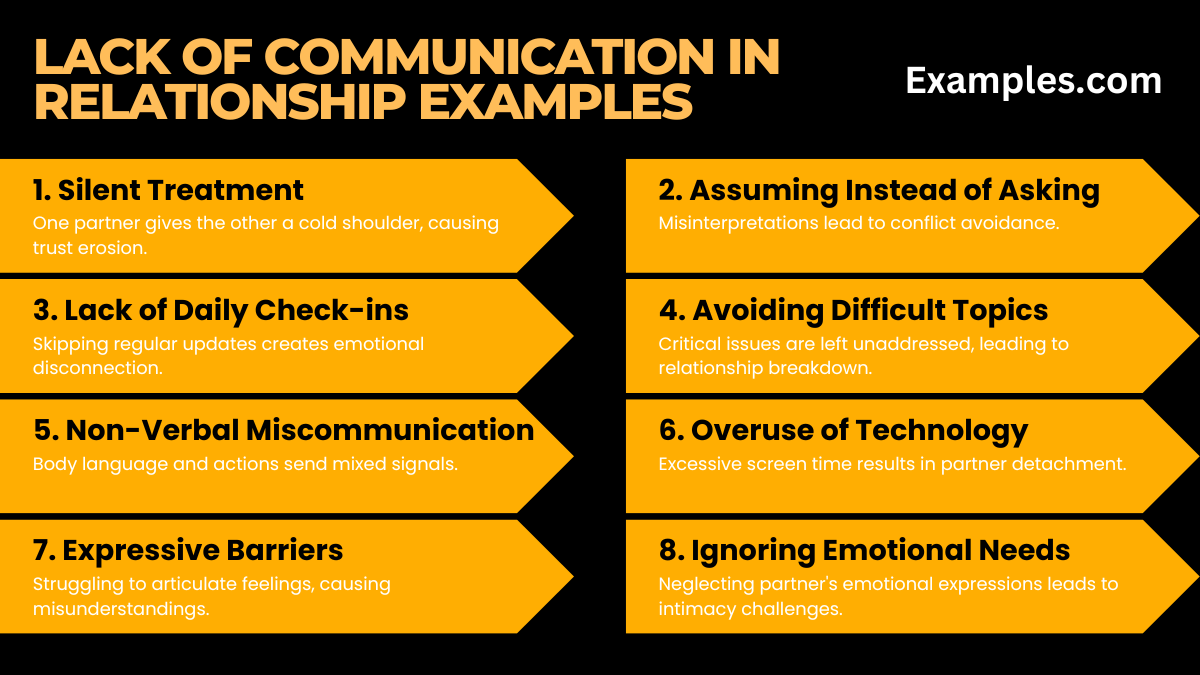
Effective communication is key to a flourishing relationship. However, when it falters, numerous issues arise. Here areten unique examples of lack of communication in relationships, identifying their Lack of communication causes and offering solutions. From emotional disconnection to non-verbal misunderstandings, each example sheds light on how silence can damage bonds. Understanding these scenarios is crucial in identifying and rectifying communication gaps, thereby paving the way for healthier, more understanding partnerships.
- Silent Treatment: One partner gives the other a cold shoulder, causing trust erosion.
Cause: Often a result of anger or disappointment.
Fix: Open dialogue about underlying issues. - Assuming Instead of Asking: Misinterpretations lead to conflict avoidance.
Cause: Fear of confrontation or misunderstanding.
Fix: Encourage clarifying conversations. - Lack of Daily Check-ins: Skipping regular updates creates emotional disconnection.
Cause: Busy schedules or complacency.
Fix: Set aside time for daily conversations. - Avoiding Difficult Topics: Critical issues are left unaddressed, leading to relationship breakdown.
Cause: Fear of conflict or upsetting the partner.
Fix: Establish a safe space for honest communication. - Non-Verbal Miscommunication: Body language and actions send mixed signals.
Cause: Inconsistency between words and actions.
Fix: Enhance awareness of non-verbal cues. - Overuse of Technology: Excessive screen time results in partner detachment.
Cause: Technology as a barrier to real conversation.
Fix: Implement tech-free times. - Expressive Barriers: Struggling to articulate feelings, causing misunderstandings.
Cause: Lack of emotional vocabulary or confidence.
Fix: Practice expressing emotions in a safe environment. - Ignoring Emotional Needs: Neglecting partner’s emotional expressions leads to intimacy challenges.
Cause: Inability to recognize or value emotional cues.
Fix: Develop empathy and active listening skills. - Blame Game: Constant blaming hampers effective communication.
Cause: Unresolved resentments or ego clashes.
Fix: Focus on problem-solving, not fault-finding. - Cultural or Language Differences: Misinterpretations due to diverse backgrounds.
Cause: Varied communication styles or language barriers.
Fix: Seek understanding and patience in learning each other’s styles.
Lack of Communication Meme

Statistics Highlighting the Impact of Poor Communication in Relationships
Effective communication is crucial in relationships, yet its absence can significantly impact relationship dynamics. This content block presents key statistics and insights into how lack of communication affects relationships.
- Divorce Rates and Communication Issues: A pivotal study by The Gottman Institute identifies communication problems as a primary cause of divorce, cited by 65% of couples. This highlights the essential role of communication in sustaining a marriage.
- Relationship Satisfaction: Psychology Today reports a direct correlation between communication quality and relationship happiness. Couples with communication struggles are three times more likely to be unhappy.
- Negative Communication Patterns: The University of Washington’s research reveals that destructive communication styles, like criticism and contempt, are strong predictors of relationship dissatisfaction and divorce. This research is explored in the study “Predicting Divorce among Newlyweds from the First Three Minutes of a Marital Conflict Discussion,”
- Gender Differences in Communication: Pew Research Center’s study shows varying perceptions of communication importance between men and women, influencing relationship dynamics.
Signs of Lack of Communication in a Relationship
Identifying the signs of lack of communication in relationship or lack of communication in marriage is crucial in addressing the issue before it escalates.
Here are key indicators to watch out for:
- Frequent Misunderstandings: Regular confusion and misinterpretation between partners indicate a breakdown in clear communication.
- Emotional Distance: An increasing sense of disconnection or loneliness, even when together, highlights a significant communication gap.
- Reduced Affection: A noticeable decrease in verbal or physical expressions of love can signal growing apart.
- Avoidance of Meaningful Conversations: Shying away from discussions about feelings, future plans, or important decisions points to a barrier in expressing oneself.
- Increase in Arguments: A rise in conflicts, often over trivial matters, can be a sign of underlying communication issues.
- Lack of Empathy: Difficulty in understanding or relating to each other’s perspectives or emotions is a significant red flag.
- Secret Keeping: Withholding information, big or small, suggests a lack of trust or fear of open communication.
- Change in Communication Patterns: Drastic changes in the frequency and quality of communication can signify underlying issues.
- Feeling Unheard or Misunderstood: Consistently feeling that your partner doesn’t understand or listen to you is a clear sign of communication problems.
- Lack of Eye Contact in Relationship: Avoiding eye contact during conversations can indicate a lack of engagement or willingness to connect openly.
- Lack of Interest in Each Other’s Lives: Diminishing conversations about daily experiences or interests is a warning sign of dwindling communication.
Recognizing these signs can help in taking proactive steps to improve communication and strengthen the relationship.
Reasons for Lack of Communication in a Relationship
Understanding the reasons behind lack of communication can help in addressing and rectifying the issue.
Common causes include:
- Fear of Conflict: Avoiding communication to prevent arguments or discomfort.
- Stress and External Pressures: Work, family, or personal stress can divert attention from effective communication in the relationship.
- Past Traumas or Experiences: Previous negative experiences in relationships can lead to emotional disconnection.
- Differences in Communication Style: Divergent ways of expressing thoughts and feelings can create misunderstandings.
- Lack of Time: Busy schedules can lead to prioritizing other aspects of life over the relationship.
- Technological Interference: Over-reliance on digital communication can erode face-to-face interaction quality.
- Erosion of Trust: Past betrayals or disappointments can create barriers to open communication.
- Unresolved Issues: Accumulated grievances or unsolved problems can hinder honest dialogue.
- Lack of Emotional Intelligence: Difficulty in understanding and expressing emotions can create expressive barriers.
- Cultural or Background Differences: Different upbringing or cultural backgrounds can affect communication preferences and interpretations.
How to Fix Lack of Communication in a Relationship
Repairing lack of communication requires commitment and effort from both partners.
Here are effective strategies:
- Establish Regular Check-Ins: Set aside a specific time daily or weekly for uninterrupted conversation to share thoughts and feelings.
- Practice Active Listening: Focus on understanding your partner’s perspective without interrupting or planning your response.
- Express Yourself Clearly: Articulate your needs and feelings honestly and respectfully, avoiding blame or criticism.
- Create a Safe Communication Space: Ensure a judgment-free environment where both partners feel safe to express their true feelings.
- Seek to Understand, Then to Be Understood: Prioritize understanding your partner’s point of view before trying to get your point across.
- Use “I” Statements: Communicate issues from your perspective to avoid sounding accusatory.
- Learn Each Other’s Communication Styles: Recognize and adapt to each other’s unique ways of expressing thoughts and feelings.
- Limit Technology Use: Designate tech-free times to focus solely on each other.
- Consider Counseling: Professional guidance can help overcome deep-rooted communication barriers.
- Rebuild Trust: Work on aspects that have eroded trust to create a more open and honest communication channel.
Effects of Lack of Communication in a Relationship
The repercussions of lack of communication can be far-reaching and damaging:
- Emotional Disconnection: Partners may feel isolated, lonely, and misunderstood, leading to a sense of emotional distance.
- Increase in Conflicts: Misunderstandings and frustrations can escalate into frequent and intense arguments.
- Decrease in Intimacy: Both emotional and physical intimacy may suffer, leading to a less satisfying relationship.
- Trust Erosion: Without open communication, trust can deteriorate, making partners question each other’s commitment and honesty.
- Stress and Anxiety: The ongoing tension can contribute to individual stress and anxiety, affecting mental health.
- Relationship Breakdown: Prolonged communication issues can lead to the breakdown of the relationship, including breakups or separation.
- Impact on Children: If children are involved, they can be negatively affected by the strained atmosphere.
- Decreased Personal Growth: Lack of supportive communication can stifle personal development and self-esteem.
- Social Withdrawal: One or both partners may withdraw from social activities and support networks.
- Professional Impact: The stress from home can spill over into work performance and professional relationships.
Can a Relationship Survive Lack of Communication?
A relationship can survive with poor communication, but it often leads to dissatisfaction and disconnection. Addressing communication issues is crucial for a healthy, lasting relationship.
Why am I Struggling to Communicate with My Partner?
Struggling to communicate can stem from fear of conflict, different communication styles, past traumas, or lack of emotional skills. Understanding these barriers is key to improving dialogue.
How Do You Deal with a Partner That Does Not Communicate?
Dealing with a non-communicative partner involves patience, empathy, and creating a safe space for open dialogue. Encourage honest expression and practice active listening to foster better communication.
Download Lack of Communication in Relationship Essays Bundle
Addressing lack of communication in relationships is vital for maintaining a healthy bond. Understanding the examples, recognizing the signs, and being aware of the effects are key steps. Implementing effective strategies to enhance communication can significantly improve relationship dynamics. Open, honest dialogue, coupled with empathy and patience, paves the way for stronger, more resilient partnerships.



